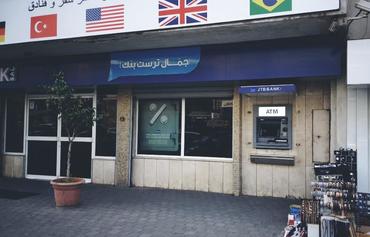The recent attempt by a Lebanese minister affiliated with Hizbullah to strengthen ties between the central banks of Lebanon and Iran would place Lebanon under pressure and jeopardise its financial credibility, economists say.
During a late August visit to Iran, where he met with Iranian officials, Minister of Industry Hussein Hajj Hassan, a member of Lebanon's Hizbullah party, spoke of measures to foster trade and financial exchange between the two countries.
The minister's plan, which comes one year after the lifting of international sanctions on Iran, "aims to increase trade with Iran", economic and strategic expert Jassim Ajaka told Al-Mashareq.
But this plan "faces legal, practical and political problems", Ajaka said.
The minister raised the possibility of co-operation between the central banks of Lebanon and Iran following a request to Lebanon's Central Bank governor Riad Salameh from his Iranian counterpart asking that the two sides work together to open branches of Lebanese banks in Iran.
This proposal faces obstacles, however, as " Lebanon's Central Bank operates in compliance with international standards on anti-money laundering, counter-terrorism financing (AML/CTF), tax evasion and application of US sanctions on Hizbullah ", Ajaka said.
It also would be difficult to verify Iran’s compliance in this area, he said, "especially as it does not recognise the US law that imposes the sanctions on Hizbullah".
Salameh would not put Lebanon at risk of international sanctions, he added.
Sanctions only partially lifted
From a practical perspective, Ajaka said, international sanctions on Iran have been only partially lifted, and there is a standing ban on the export of all goods to the country.
From a political perspective, he added, some countries -- such as the Gulf states, and Saudi Arabia in particular -- will take economic and financial action against Lebanese businesses that deal with Iran.
"This will prevent any Lebanese businessman who has investments in the Gulf from dealing with Iran, at the risk of losing his business in those countries, which means that dealing with Iran will be confined to a segment of the Lebanese and will thus increase the economic divide," Ajaka said.
"The possible scenarios stemming from minister Hajj Hassan’s proposition require that a meeting take place between the governor of Lebanon’s Central Bank and his Iranian counterpart," he said.
Any agreement between the two would then need to be submitted to the cabinet, where it will be met with opposition from the political parties, he added.
Moreover, "despite the lifting of sanctions, the actual ban on dealing with Iran's central bank has not been lifted, due to international pressure".
Outside the global financial system
"Economic and financial relations, and even tourism between Lebanon and Iran, are very poor, and bilateral trade between them does not exceed $100 million a year because of the sanctions imposed on Iran," economic expert Ghazi Wazni told Al-Mashareq.
Official visits to Iran to foster ties, "particularly financial ones", have not accomplished anything, he said. "As long as Iran is out of the global financial system, there will be no ties, financial or otherwise, between the two countries."
The Lebanese banking sector must reconsider this relationship and exercise caution in order to preserve Lebanon's financial reputation and the credibility it enjoys within the global financial system, Wazni said.
Banking with Iran "is not as easy as was portrayed by the Minister of Industry", said Arab Economic News editor-in-chief Violette Ghazal al-Balaa, noting that Iran has yet to enter the global banking market.
"There are still sanctions imposed by the US on Tehran, the most prominent of which pertain to the banking and financial aspects," she told Al-Mashareq.
Lebanon should "be mindful of the consequences of US sanctions on Hizbullah, which is close to Iran, that have placed additional strain on banks in Lebanon", she added.
Opening any financial or banking channels with Iran would further complicate matters and expose Lebanon to additional pressures that it can do without at this time, she said.
Hajj Hassan's talk of a "deposit" that Tehran may make in Lebanon’s Central Bank "is inappropriate as long as the sanctions are still in place and prohibit any foreign banking investment in Tehran", al-Balaa said.

![Lebanese Minister of Industry Hussein Hajj Hassan meets with Central Bank of Iran governor Valiollah Seif. [Photo courtesy of Lebanon's National News Agency]](/cnmi_am/images/2016/09/30/6258-Lebanon-iran-bankers-600_384.jpg)






